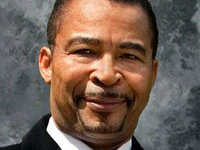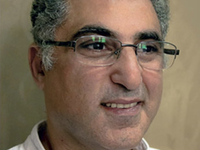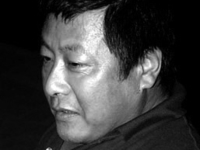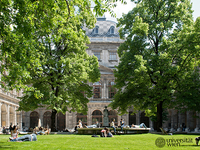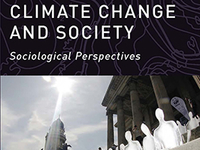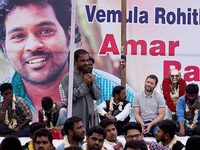GD 6.2 - June 2016
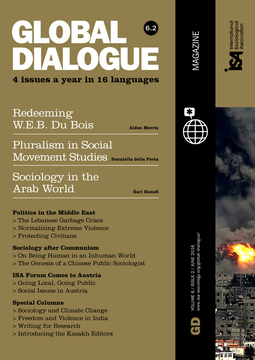
Global Dialogue is available in multiple languages!
Select the language to download the issue.
Editors:
Michael Burawoy.
Associate Editor:
Gay Seidman.
Managing Editors:
Lola Busuttil, August Bagà.
Consultants:
Ana Villarreal.
Media Consultant:
Gustavo Taniguti.
Consulting Editors:
Margaret Abraham, Markus Schulz, Sari Hanafi , Vineeta Sinha, Benjamin Tejerina, Rosemary Barbaret, Izabela Barlinska, Dilek Cindoğlu, Filomin Gutierrez, John Holmwood, Guillermina Jasso, Kalpana Kannabiran, Marina Kurkchiyan, Simon Mapadimeng, Abdul-mumin Sa’ad, Ayse Saktanber, Celi Scalon, Sawako Shirahase, Grazyna Skapska, Evangelia Tastsoglou, Chin-Chun Yi, Elena Zdravomyslova.
REGIONAL EDITORS
Arab World: Sari Hanafi , Mounir Saidani.
Argentina: Juan Ignacio Piovani, Pilar Pi Puig, Martín Urtasun.
Brazil: Gustavo Taniguti, Andreza Galli, Ângelo Martins Júnior, Lucas Amaral, Benno Alves, Julio Davies.
India: Ishwar Modi, Rajiv Gupta, Rashmi Jain, Jyoti Sidana, Pragya Sharma, Nidhi Bansal, Pankaj Bhatnagar.
Indonesia: Kamanto Sunarto, Hari Nugroho, Lucia Ratih Kusumadewi, Fina Itriyati, Indera Ratna Irawati Pattinasarany, Benedictus Hari Juliawan, Mohamad Shohibuddin, Dominggus Elcid Li, Antonius Ario Seto Hardjana.
Iran: Reyhaneh Javadi, Abdolkarim Bastani, Niayesh Dolati, Vahid Lenjanzade.
Japan: Satomi Yamamoto, Amane Hisada, Takashi Kitahara, Takehiro Kitagawa, Satoshi Manabe, Tomomi Ohashira, Yutaro Shimokawa, Masaki Yokota.
Kazakhstan: Aigul Zabirova, Bayan Smagambet, Adil Rodionov, Gani Madi, Almash Tlespayeva, Almas Rakhimbayev, Amangeldi Kurmetuly.
Poland: Jakub Barszczewski, Krzysztof Gubański, Justyna Kościńska, Kamil Lipiński, Mikołaj Mierzejewski, Karolina Mikołajewska- Zając, Adam Müller, Zofi a Penza, Teresa Teleżyńska, Justyna Zielińska, Jacek Zych.
Romania: Cosima Rughiniș, Corina Brăgaru, Adriana Bondor, Alexandra Ciocănel, Ana-Maria Ilieș, Ruxandra Iordache, Mihai-Bogdan Marian, Ramona Marinache, Anca Mihai, Oana-Elena Negrea, Ion Daniel Popa, Diana Tihan, Carmen Voinea.
Russia: Elena Zdravomyslova, Anna Kadnikova, Asja Voronkova, Lyubov’ Chernyshova, Anastasija Golovneva.
Taiwan: Jing-Mao Ho.
Turkey: Gül Çorbacıoğlu, Irmak Evren.
GD 6.2 - June 2016
Editorial
Sociology from the Margins
The most innovative sociology often comes from the margins of academia and sometimes even from outside academia altogether. A case in point is W.E.B. Du Bois, probably the most significant US sociologist to have walked the planet. He is the subject of Aldon Morris’s new book, The Scholar Denied, featured in this issue. Morris shows that Du Bois, an African-American sociologist trained in Germany and Harvard, led and organized the Atlanta School of Sociology, every bit as scientific and rigorous as the hallowed Chicago School. Were it not for the racism of academia then and, indeed, now, Du Bois would have been recognized as the true founder of US sociology. Unappreciated and unrecognized he left academia to become an editor and commentator on public affairs, from where he authored some of the most significant books on race and class, the subjective experience of racism, Pan-Africanism, and US imperialism.
In this issue we have other representatives of sociology from the margins. Dmitri Shalin describes the courage and integrity with which Vladimir Yadov engaged the bureaucratic structures of the Soviet Union and the vision he carried forward into the post-Soviet period. Similarly, François Lachapelle describes how Shen Yuan’s experience as a Marxist-Leninist and Red Guard led him to a critical sociology, becoming a charismatic figure who inspires the imagination of his students. Sari Hanafi, here interviewed by Mohammed El Idrissi, followed the difficult road from the Palestinian Refugee camps of Syria to a sociology doctorate in France and lengthy periods in Cairo and Ramallah before settling in Beirut where he founded and edits the Arab Journal of Sociology, Idafat. Fearless in his critique of authorities he lives a precarious existence, giving energy to sociology in the Middle East.
Staying in the Middle East, Nisrine Chaer offers a fascinating analysis of the Lebanese garbage crisis and the social movements they generated, while Lisa Hajjar and Amitai Etzioni argue with one another about the legitimacy of the real and potential extension of Israeli violence against Lebanese civilians.
Finally we make the rounds of national associations. We have a series of articles from Austria – an introduction to the Third ISA Forum that will be held in Vienna, July 10-14, 2016, followed by four articles showcasing the exciting research of young Austrian sociologists. From the US, Riley Dunlap and Robert Brulle summarize their impressive collection on climate change that emerged from a Task Force of the American Sociological Association. We also reproduce statements by the ISA Executive Committee and by Indian sociologists condemning violence and threats to freedom of expression on Indian campuses. From Australia, Raewyn Connell culls together her long experience in teaching young sociologists how to write up their research. We end with introductions to Global Dialogue’s pioneering Kazakh team who have taken on the daunting challenge of translating sociology into their national language.
Michael Burawoy, editor of Global Dialogue
Global Dialogue can be found in multiple languages.
Submissions should be sent to globaldialogue@isa-sociology.org.

